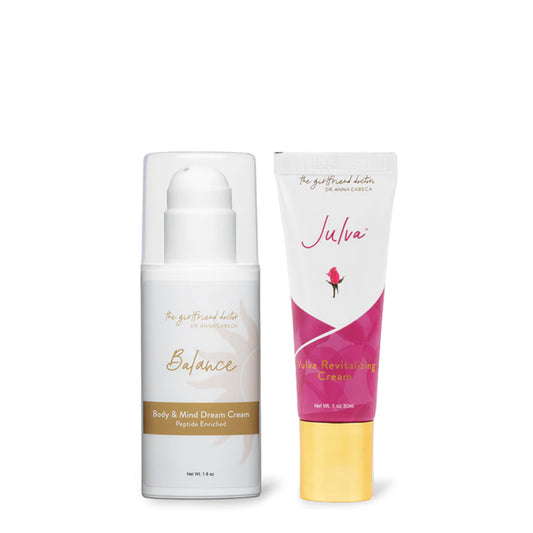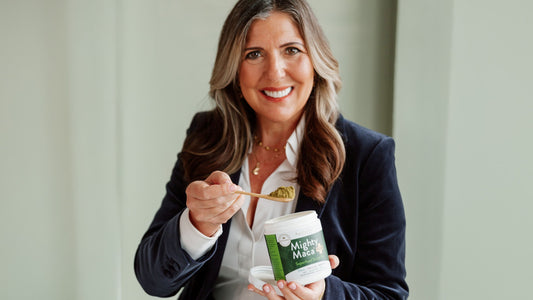Menopause and mood. There’s definitely a connection. A connection that the majority of menopausal women feel. Whether it’s in the form of mood swings, anxiety, depression, or difficulty with focus and concentration, it’s very common for menopause to affect your brain and your mood.
So if you’ve been dealing with mood changes related to menopause, you’re not alone.
Let’s explore why menopause and mood are connected — and things you can do to help feel better and more balanced.
If you’ve reached this article because you’re struggling with depression, anxiety, or suicidal thoughts, call SAMSHA’s hotline at 800-662-4357. SAMHSA’s National Helpline is a free, confidential, 24/7, 365-day-a-year treatment referral and information service (in English and Spanish) for individuals and families facing mental health crises and/or substance use disorders. You can also visit their website here, or send your zip code via text to 435748 (HELP4U) to find help near you.

Moods During Menopause
There’s no doubt that menopause affects cognition and mood. But what exactly does that look and feel like?
Menopause mood symptoms can vary widely, but it’s important to remember that changes to your mood don’t have to necessarily involve huge shouting matches with your partner, or menopause crazy mood swings, where you’re laughing one minute and crying the next.
While menopause can and certainly does make you moody and irritable, there are also plenty of women who also experience things like:
Anxiety
Depression
Forgetfulness
Feeling numb
Loss of confidence
Lack of self-esteem
Difficulty concentrating
Yes, it can be a very challenging, sad, and lonely road when menopause and low mood intersect.
The Relationship Between Hormones And Mood
Estrogen is a key actor when it comes to the way menopause affects mood.
This is because estrogen plays a huge role in your brain, and, it influences other chemicals in your brain, like dopamine, serotonin, and norepinephrine…which are key neurotransmitters that affect your mood, focus, learning, and executive function. (1,2,3)
So it makes sense that menopause can cause mood changes.
Let’s dig into how it happens.
Peri Menopause And Mood Swings
You see, beginning in perimenopause, your hormone levels begin to change and your mood tends to suffer as a result. (4)
Typically, progesterone takes a sharp and swift nosedive, and estrogen levels usually bounce up and down erratically. A lot of women start to experience perimenopause mood swings during this time. In essence, you experience estrogen dominance, even as your estrogen levels are falling.
But, because perimenopause can start early (for some women as early as age 35), you might not make the connection between perimenopause and low mood. And a lot of doctors might not make the connection, either.
During perimenopause, you’re still cycling, albeit irregularly. And during this time, a lot of women feel emotional during ovulation.
This is because, typically, up until this point in life, your body has produced ample amounts of progesterone after you ovulate.
Progesterone, Menopause, And Mood
Progesterone helps to balance out estrogen. Progesterone is a calming force. In other words, progesterone keeps estrogen from making you feel anxious or angry or unsettled.
But in perimenopause, progesterone production can be unpredictable. This is because in perimenopause, you’re likely to have anovulatory cycles (where you don’t ovulate). No ovulation, no progesterone.
This leaves you without ample progesterone to calm estrogen down. And it’s when things can get emotional quickly.
Again, these menopause and mood symptoms can range from wild mood swings and intense irritability to anxiety and worry.
Recent studies indicate that women are 40% more likely to experience depression in perimenopause then in other phases of life. (5)
And some research indicates that 58% of women suffer from anxiety during perimenopause and menopause. (6)
These problems with mood in menopause are often amplified for individuals with neurodivergence. (7)
Menopause Mood Help
So, if you’re asking “what can I take for menopause mood swings?” you’re definitely not alone.
From a medical standpoint, your doctor may take a few different approaches to tackling menopause moods.
A lot of women are prescribed antidepressants during this time. And depending on where your hormone levels are, your doctor may recommend hormone replacement therapy (HRT) as a measure to help your mood, too.
While these are the most common standard treatments, there are also lots of things you can do to help control the situation, too. Let’s explore some menopause mood swings natural remedies and discuss some lifestyle changes you should consider.

1. Menopause Self Care
For too long, we’ve been taught to put ourselves last. That self-care is some kind of indulgence we don’t deserve.
But now is the time to unapologetically take care of yourself, Girlfriend.
I’m not necessarily talking about bubble baths or getting your nails done (but if that’s what lifts your mood, go for it!)
I’m talking about the kind of deep-rooted self-care that starts with declaring to yourself that you are worth treasuring. That you deserve the same level of devotion and care that you’ve shown to everyone in your life up until this point.
My Menopause Self Care List
1. Rest — getting a full night’s sleep (most women need 7-9 hours) is one of the greatest gifts you can give yourself. Sleeping when you’re tired isn’t lazy — it’s an incredible act of self-care, and it’s an essential foundation for your health, especially if you want to help your mood.
2. Sexual Pleasure — when you experience love and physical connection, your body produces a hormone called oxytocin. Oxytocin floods your body with relaxation and destroys anxiety and stress. Sex isn’t the only way to encourage oxytocin, but it is one of the most fun ways!
If sex hurts, be sure to check out the Hormone Harmony Bundle that includes my patented vaginal restorative cream that pumps up the moisture and your libido ;)
If you’re having trouble even getting in the mood, be sure to check out my free arousal tips here.
3. Exercise — exercise is one of the best things you can do for your body, especially if you’re struggling with menopause mood swings. Studies indicate exercise can make a huge difference in depression symptoms. (8) It’s also fantastic at relieving stress. But I know it can be difficult to get started when you’re feeling low, your energy is down, and you’re anxious. Just try to start slow, with a 10 minute walk, and see how it makes you feel.

2. Find Your People
There’s nothing more important than finding a community of like-minded souls who are on the same path as you.
When you find “your people” you feel unconditional love and support.
And when you feel that kind of belonging, it can and does make a huge difference in your mood.
It can also make a difference in your likelihood of developing a disease and your lifespan, too. According to research, people with strong social connections are more likely to live longer. (9)
Personally, when I feel connected to my community, I know I feel happier and healthier. And that’s why I meet with the members of my Girlfriend Doctor Club twice a month. It helps rejuvenate my spirit and lifts me up like nothing else can. If you’re not a member yet, I’d love to have you join us! Click here to sign up and I’ll chat with you soon!

3. HRT, Menopause, and Mood Changes
There’s no denying that progesterone is so critical for your mood during menopause.
I know that there’s a lot of fear-mongering when it comes to HRT, but I’ve seen bioidentical hormones make a huge difference in many women’s quality of life.
That’s why I developed my Hormone Harmony Bundle, a combination of my two most popular products, Julva® and Balance.
This power couple combines bioidentical progesterone and pregnenolone with DHEA to bring you a gentle yet effective answer to your menopause prayers.
These bioidentical hormones help support your mood, hot flashes, and even help your vaginal tissues and libido come back to life.
Learn more about the Hormone Harmony Bundle here.
Menopause And Mood: How To Get Things Under Control
Mood symptoms in menopause are some of the most challenging to deal with. It can be so hard to lose your mojo and your mind at a time when you’re also battling debilitating physical symptoms too.
Please, don’t be afraid to put your self-care needs first, reach out to your community, and, when in doubt, add some bioidentical hormones to your toolkit, too.







